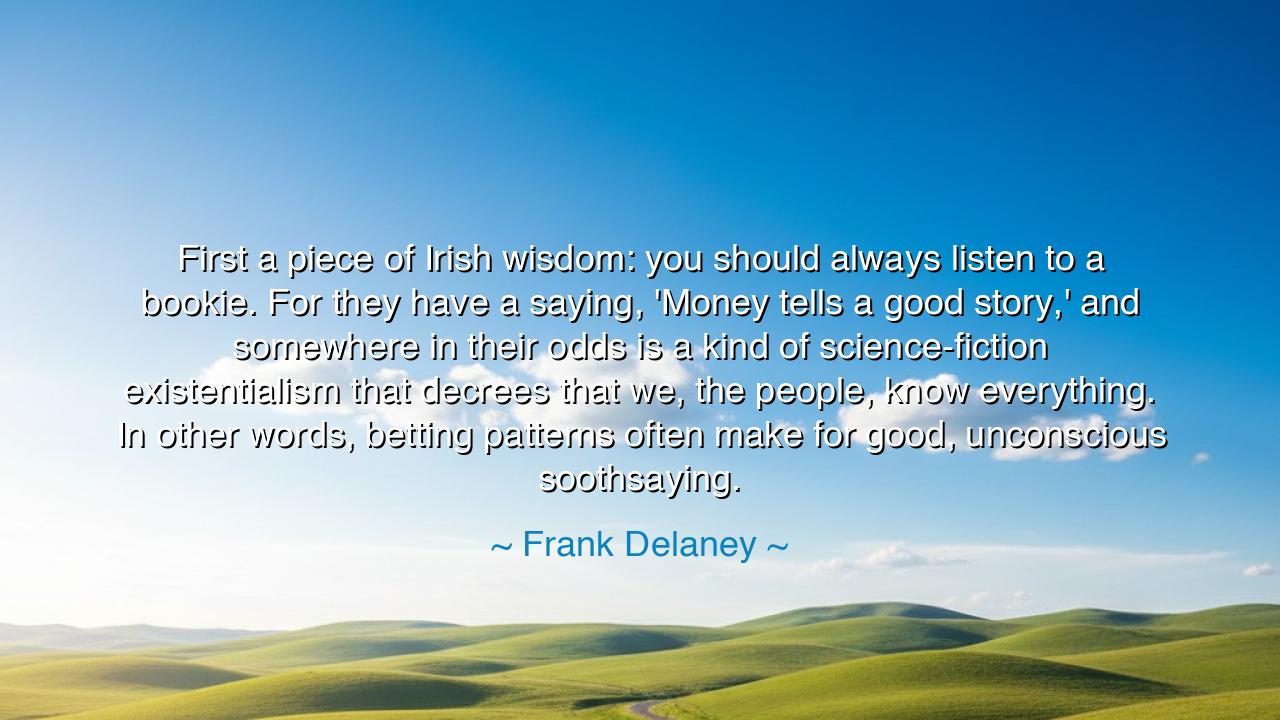
First a piece of Irish wisdom: you should always listen to a
First a piece of Irish wisdom: you should always listen to a bookie. For they have a saying, 'Money tells a good story,' and somewhere in their odds is a kind of science-fiction existentialism that decrees that we, the people, know everything. In other words, betting patterns often make for good, unconscious soothsaying.






Hearken, O seekers of insight, to the words of Frank Delaney, who illuminates a curious nexus between wisdom, money, and the unseen patterns of human choice. He counsels that one should always listen to a bookie, for in their subtle craft lies a truth often overlooked: money tells a good story. In the flow of wagers, the hopes, fears, and judgments of many converge, revealing patterns that speak not only of chance, but of the collective pulse of humanity itself. Here is a teaching for the ages: the world’s secrets are sometimes whispered, not in speeches or scrolls, but in the currency of belief and desire.
The origin of this reflection lies in Delaney’s life as a storyteller and observer of human behavior, one attuned to the patterns of society that reveal themselves in the ordinary and unexpected. He discerned that betting, often dismissed as folly, conceals a mirror of the human condition: the wagers of the many encode fears, hopes, and intuitions, offering a kind of unconscious soothsaying. In the odds, there is a tale of confidence and doubt, of collective judgment and the hidden currents of human perception.
The meaning of this aphorism is profound: wealth and its flow can illuminate truths that the tongue and reason alone may miss. To heed the bookie is to recognize that insight often arises where one least expects it—in the seemingly mundane actions of ordinary people. Their choices, aggregated in the pursuit of gain, reveal a form of existentialism, a reflection of our knowledge, beliefs, and fears, distilled into patterns that speak louder than any prophecy.
History offers vivid testimony to this principle. Consider the London Stock Exchange in the early twentieth century, where the investments of the many, guided by instinct and observation, often foretold economic shifts before the hand of formal analysis could perceive them. In these patterns, the collective wisdom of individuals, expressed through money, became a subtle oracle, shaping markets and outcomes, much as Delaney describes in the realm of betting.
Moreover, this truth extends beyond finance and gaming. Every action, every choice, every investment of thought or resource can reveal the hidden currents of human judgment. The wise observer, attuned to these flows, perceives truths about society, morality, and destiny that elude conventional scrutiny. In this, the bookie is transformed from a mere purveyor of wagers to a guardian of insight, whose odds carry the echoes of humanity’s unconscious wisdom.
O generations yet to come, carry this counsel as a lantern in the murky corridors of perception: money, when watched with care, tells stories that words may fail to convey. Listen to the flow of human choice, discern the patterns, and honor the subtle, often hidden wisdom encoded therein. For in the quiet currents of desire, fear, and confidence, one may discover truths about the world, and about the hearts of men, that no oracle or sage could reveal with greater clarity.






KKimanh1988
I find myself reflecting on how information flows through seemingly casual choices. Does Delaney suggest that unconscious human preferences, expressed through money, reveal truths we might not consciously acknowledge? I’d like to explore whether studying these patterns is more about statistical probability, behavioral insight, or philosophical reflection on human nature. Can such observations serve as a legitimate form of foresight, or are they primarily a narrative device for understanding societal instincts?
DMDuyen My
This statement prompts me to think about the metaphorical implications of betting. Could the ‘science-fiction existentialism’ Delaney mentions reflect our desire to impose order on randomness and uncertainty? I’m curious whether the wisdom lies in interpreting the patterns or simply in recognizing the human tendencies that generate them. How might these insights about collective behavior influence fields like economics, politics, or risk assessment beyond the gambling world?
VHVy Ha
Reading this, I question the balance between rational calculation and human psychology in betting. Is Delaney implying that the unconscious decisions of many people, aggregated through money, produce insights that individual reasoning cannot? I’d like to consider whether this concept could be applied ethically to other forms of data-driven prediction, and what it says about the power of collective intuition in understanding complex or uncertain outcomes.
THVu Thi Thu Hien
I’m intrigued by the idea that bookies’ odds encode a kind of existential insight. Does this mean that seemingly trivial gambling behavior can reveal deeper truths about collective beliefs and fears? I’d like to explore how much statistical analysis versus instinct drives these odds. Could observing patterns in betting offer genuine predictive power, or is it mostly a reflection of cultural biases and popular sentiment?
TTLe Thi Thanh Thao
This quote makes me think about the intersection of economics, human behavior, and foresight. Is Delaney suggesting that collective betting patterns can reveal unconscious knowledge or intuition about future events? I’m curious whether this approach has parallels in other areas, such as stock markets or crowd-sourced predictions. How reliable is the idea that ‘money tells a good story,’ and can it truly serve as a tool for understanding human expectations and societal trends?